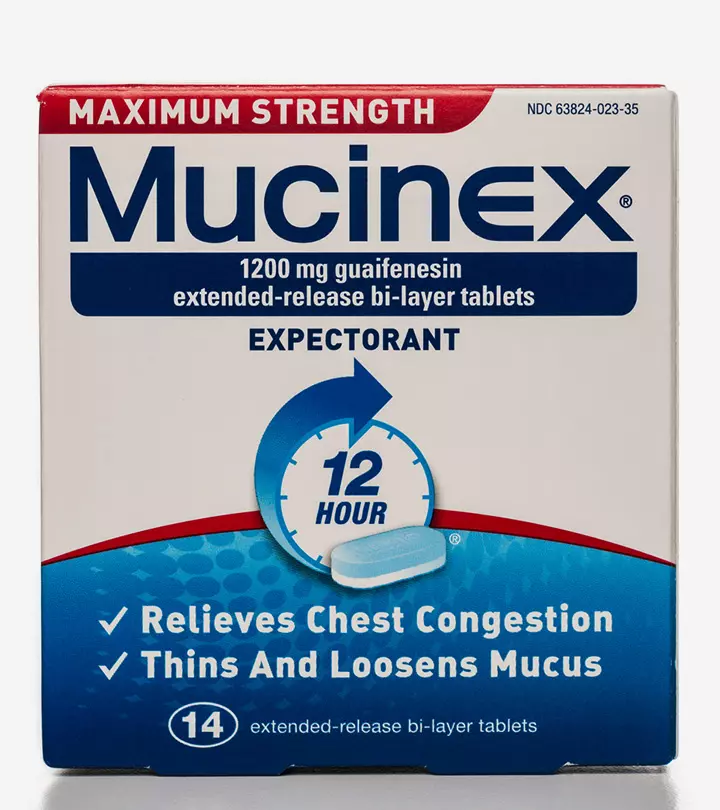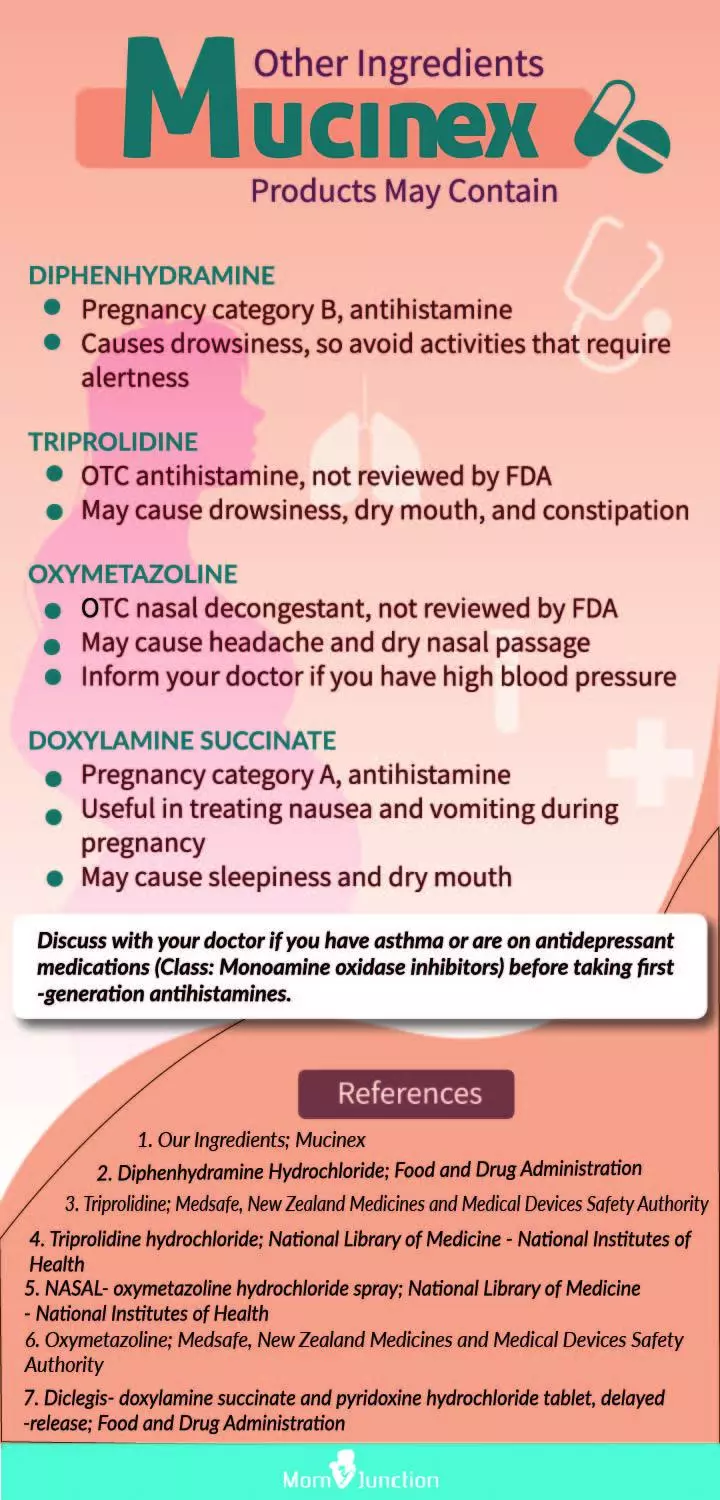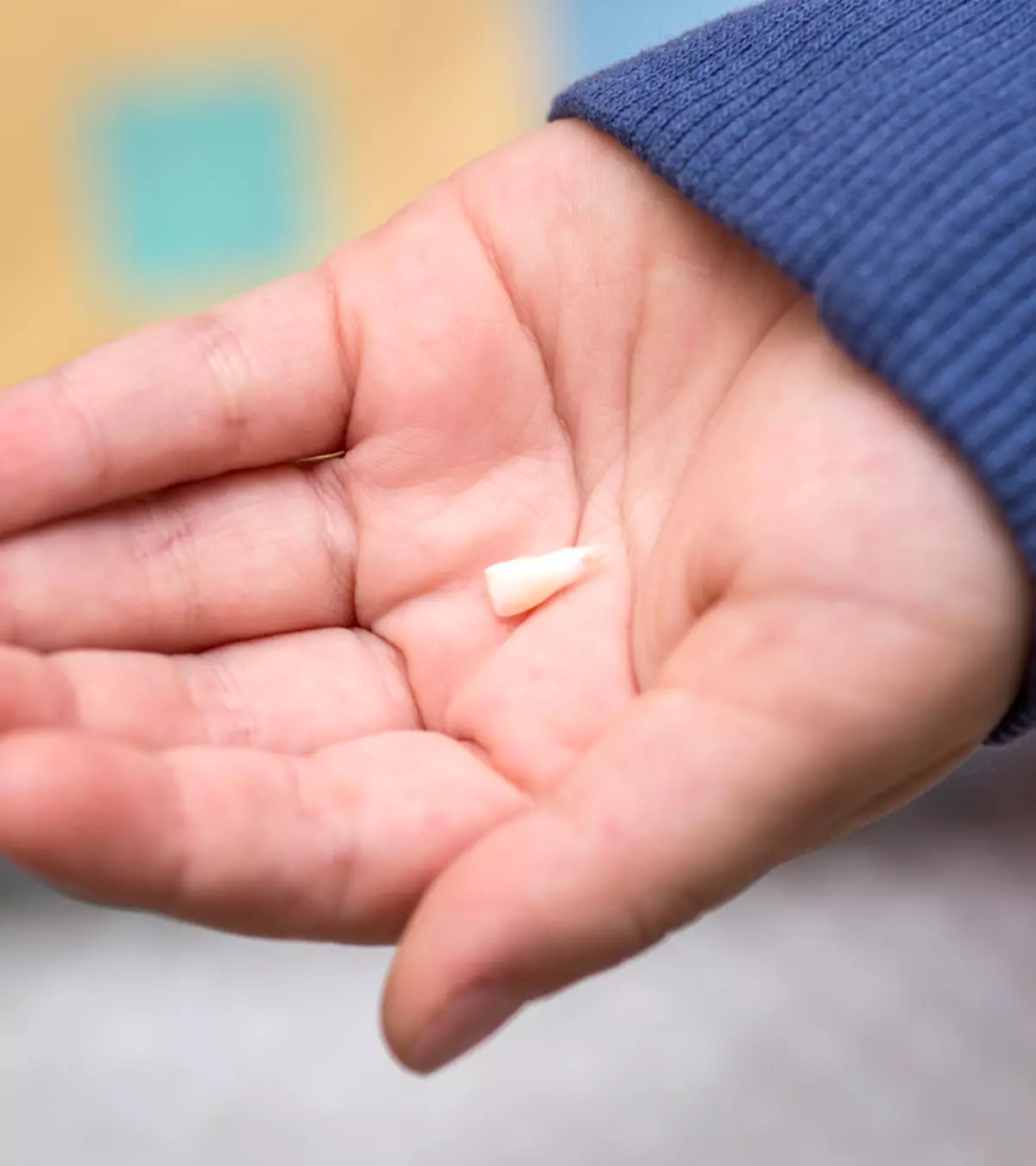
Image: iStock
Mucinex is an over-the-counter medication to treat colds and coughs. If you are taking Mucinex while pregnant, you need to be cautious. It is essential to consult your healthcare provider before using any over-the-counter medication during pregnancy to ensure the safety of both mother and baby. Varying in composition and strength, the range of medicines includes tablets, capsules, and syrups. Contracting a common cold and cough during pregnancy can keep you ill for longer or make you feel more tired than you normally feel (1). Therefore, you should consult your healthcare practitioner before taking over-the-counter medicines, including Mucinex.
Read on to understand whether it is safe for pregnant women to take Mucinex, the different Mucinex products’ composition, risks, and side effects.
Key Pointers
- Mucinex is a drug used to relieve cold and flu, and its safety depends on its variant used since each has different ingredients.
- The dosage of the Mucinex varies as per trimester. Therefore, you must have the drug only after doctor consultation.
- Common side effects of Mucinex include drowsiness, nausea, irritability, and sleep problems.
What Is Mucinex?
Mucinex is a brand with most products containing the generic drug Guaifenesin alone or combined with Dextromethorphan, Phenylephrine, and Acetaminophen
. A few products may contain other drugs such as Diphenhydramine, Triprolidine, Oxymetazoline, or Doxylamine (2).
Mucinex is used to relieve cold and flu symptoms such as cough and congestion in the chest or airways. The following table summarizes the composition of some notable Mucinex products (3).
| Product Name | Guaifenesin | Dextromethorphan | Phenylephrine | Acetaminophen | |||||||
|---|---|---|---|---|---|---|---|---|---|---|---|
| Indicated for cough and chest congestion relief | |||||||||||
| Mucinex Extended-Release Bi-Layer Tablets | 600mg | ||||||||||
| Mucinex DM Extended-Release Bi-Layer Tablets | 600mg | 30mg | |||||||||
| Indicated for cold and flu | |||||||||||
| Maximum Strength Fast-Max Severe Congestion & Cough caplets | 200mg | 10mg | 5mg | ||||||||
| Maximum Strength Fast-Max Cold, Flu & Sore Throat capsules | 200mg | 10mg | 5mg | 325mg | |||||||
Mucinex products may be available in liquid form and in double strength as well. Make sure to check the product label for a complete list of ingredients and their strengths.
Is Mucinex Safe During Pregnancy?

Image: IStock
Can I take mucinex while pregnant? This is a common question that pops into the minds of many pregnant women, and it is important to understand the safety of individual active ingredients of Mucinex to ascertain its safety in pregnancy (4). It’s essential to understand the potential risks associated with medication for cough in pregnancy.
1. Guaifenesin
It is an expectorant drug that works by thinning the mucus in the airways to relieve chest congestion. It makes coughing up the phlegm (mucus) easier. You should seek medical advice before using the drug if you have respiratory health conditions such as asthma, emphysema, or chronic bronchitis (5).
The medicine’s safety is not entirely established since it is not known if the drug crosses the placenta. Some studies note a weak association between maternal Guaifenesin use and neural tube defects (birth defects of the brain or spinal cord) and inguinal hernias in newborns. The FDA categorizes the drug in pregnancy category C, which means either the drug has demonstrated adverse effects in animal studies with no studies among women or there are no studies in animals and women.
The drug should only be had after doctor consultation and may be preferred if the benefits outweigh the risks to the fetus. Guaifenesin should ideally be avoided in the first trimester.
 Quick tip
Quick tip2. Dextromethorphan
The antitussive or cough suppressant medication works by reducing the activity of the part of the brain associated with coughing action
(6). It is a pregnancy category C drug, but human studies have not shown any risk of major malformations during pregnancy.
3. Phenylephrine
Phenylephrine decreases the swelling of the blood vessels in the nasal passages. It provides symptomatic relief from nasal congestion (stuffy nose) caused by colds, allergies, hay fever, and sinus pressure (7). This pregnancy category C drug crosses the placenta. Some studies support the association between the use of phenylephrine in the first trimester and endocardial cushion defect (congenital malformation where the walls separating all four chambers of the heart are poorly formed) (8). Hence, phenylephrine when pregnant should be had only after doctor consultation and preferably should be avoided in the first trimester.
4. Acetaminophen
It is a commonly used drug during pregnancy, with 65% of pregnant women using it at some point in pregnancy (4). Acetaminophen crosses the placenta but is not associated with any significant increase in the risk of fetal problems. Some studies associate prenatal and infant exposures to acetaminophen with mid-childhood executive function and behavioral problems, but it needs further research (9). The FDA categorizes the drug as pregnancy category B, which means that animal studies have not demonstrated any risks with no studies among women or animal studies have shown some risks, but it was not confirmed to occur in women.
The majority of the Mucinex products have ingredients whose safety is not established. Hence, it is advisable to avoid Mucinex at least during the first trimester of pregnancy. You should ideally consult your doctor if you wish to take mucinex during pregnancy.
 Point to consider
Point to considerHow Much Mucinex Is Safe During Pregnancy?

Image: Shutterstock
Mucinex dosage varies according to its product variant. Two tablets/capsules/caplets or 20ml of liquid every four hours in 24 hours is the general maximum dosing instruction as per the manufacturer. You should talk to your healthcare provider to know the suitable dosage for you during pregnancy. It’s crucial never to exceed the recommended maximum dosage and to discuss any other medications you may be taking.
The following table summarizes the maximum permissible dosage of individual drugs for expectant mothers. You may use this table only for reference and not self-medication (10).
| Active Ingredient | Maximum dose in 24 hours |
|---|---|
| Guaifenesin | 2400mg |
| Dextromethorphan | 120mg |
| Phenylephrine | 240mg |
| Acetaminophen | 3000mg |
When Can You Resume Taking Mucinex?
You may take Mucinex products for a chesty or phlegmy cough during the second and third trimester of pregnancy under medical supervision. However, Guaifenesin-only products seem safer than those with multiple active ingredients later in pregnancy and during breastfeeding (11) (12). It is important to prioritize maternal health and seek medical advice before taking any medication.
What Are The Possible Side Effects Of Mucinex?

Image: Shutterstock
Common side effects of Mucinex include (13):
- Dizziness
- Drowsiness
- Sleep problems
- Nausea
- Diarrhea
- Restlessness or irritability
Some serious side effects that need medical attention are:
- Allergic reactions such as hives, difficulty breathing, or swelling of the face, lips, or throat
- Mood changes
- Severe headache
- Anxiety or a feeling that you might faint
 Be watchful
Be watchfulWhat Are The Pregnancy-Safe Remedies For Cough And Cold?

Image: IStock
Non-medication alternatives are often recommended during pregnancy to avoid any fetal risks. You may manage your cough and cold symptoms through the following non-medical interventions (1) (12).
- Getting ample rest: Take rest often and ensure you get a good night’s sleep.
- Drinking plenty of fluids: Take water, juice, broth, or soup to keep yourself hydrated.
- Eating well: Nutritious food may accelerate the healing process and improve your immunity.
- Taking steps for congestion relief: Use a cool-mist humidifier in your room and use pillows to keep your head elevated while sleeping.
- Alleviating sore throat: Drinking warm tea, honey with lemon, and gargling with warm salt water may help soothe a sore throat.
- Take vitamins to boost your immunity: Consult a doctor and have vitamin C (1g in the morning and 1g during lunch) for the duration of the flu. You may also take vitamin D 100,000 units if not already taken during the pregnancy.
Maternal care is crucial during pregnancy, and non-medication alternatives can be a safe and effective way to manage common symptoms.
Frequently Asked Questions
1. Can Mucinex harm my unborn baby?
Mucinex use has been associated with an increased risk of neural tube defects in the fetus, especially in the first trimester, according to studies (4). Speak to your doctor to determine the potential effects based on your dosage.
2. Can Mucinex cause a miscarriage?
There is no adequate research to show that guaifenesin (primary ingredient) in Mucinex can increase the risk of miscarriage (14).
3. Is it safe to take Mucinex with other medications during pregnancy?
You should take other medications along with Mucinex only after taking consent from your doctor. Taking medicines by yourself during pregnancy can cause adverse effects. Hence, always inform your doctor about the medicines you take during pregnancy.
4. How long does it take for Mucinex to start working?
Dr. Matthew Casavant, obstetrician and gynecologist from Clermont, Florida, says, “Mucinex starts working within about 30 minutes of ingestion, with its effects peaking around two hours after consumption. However, the duration can vary based on individual metabolic rates and the specific product formulation, such as liquid versus tablet.”
It is better to avoid Mucinex while pregnant since its safety as a maternal medicine for treating cold in pregnancy is not well established. Try to avoid it in the first trimester in all possible cases. Avoid taking Mucinex over-the-counter since your doctor can prescribe pregnancy-safe medication based on the time of pregnancy, severity of symptoms, and other factors. Ensure the safety of medications before you use an OTC medication during pregnancy. Get necessary vaccinations, maintain hand hygiene, and stay away from infected people to prevent respiratory infections during pregnancy.
Infographic: Know The Label Claim
Mucinex is a brand name with multiple products containing medications of different combinations. The label that mentions all ingredients and their amounts needs to be read carefully before using any product. Save this infographic for a quick reference to the other ingredients that Mucinex products may contain and their safety for pregnant women. Illustration: Momjunction Design Team
Illustration: Mucinex When Pregnant: Safety Side Effects And Dosage

Image: Stable Diffusion/MomJunction Design Team
Find out if Mucinex aids conception. Learn whether this over-the-counter remedy enhances your chances of becoming pregnant.
References
- Cough and Cold During Pregnancy.
https://americanpregnancy.org/healthy-pregnancy/pregnancy-complications/cough-cold-during-pregnancy/ - Our Ingredients.
https://www.mucinex.com/pages/our-ingredients - Mucinex.
https://www.mucinex.com/ - Over-the-Counter Medications in Pregnancy.
https://www.aafp.org/pubs/afp/issues/2014/1015/p548.html - Guaifenesin.
https://medlineplus.gov/druginfo/meds/a682494.html - Dextromethorphan.
https://medlineplus.gov/druginfo/meds/a682492.html - Phenylephrine.
https://medlineplus.gov/druginfo/meds/a606008.html - Wai-Ping Yau et al.; (2013); Use of Decongestants During Pregnancy and the Risk of Birth Defects.
https://www.ncbi.nlm.nih.gov/pmc/articles/PMC3816336/ - Sheryl L. Rifas-Shiman et al.; (2021); Associations of prenatal or infant exposure to acetaminophen or ibuprofen with mid-childhood executive function and behaviour.
https://www.ncbi.nlm.nih.gov/pmc/articles/PMC7192774/ - Which over-the-counter cold medications are safe during pregnancy?
https://utswmed.org/medblog/otc-cold-medication-safe-pregnancy/ - Cough and cold remedies and Breastfeeding.
https://www.breastfeedingnetwork.org.uk/factsheet/cold-remedies/ - Taking Medicine During Pregnancy.
https://onlinelibrary.wiley.com/doi/10.1111/jmwh.12765 - Dextromethorphan and guaifenesin.
https://www.uofmhealth.org/health-library/d03400a1 - Guaifenesin
https://mothertobaby.org/fact-sheets/guaifenesin/
Community Experiences
Join the conversation and become a part of our nurturing community! Share your stories, experiences, and insights to connect with fellow parents.
Read full bio of Dr. Ben Abbes Taarji Hicham
- Dr. Matthew Casavant is the founding physician of South Lake OB/GYN & Advanced Surgery. He received his medical degree from Nova Southeastern University in South Florida and completed his residency as an Ob/Gyn at St. Vincent’s /Mercy Hospital in Toledo, OH. Dr. Casavant also holds a BS degree in Micro and Molecular Biology.
 Dr. Matthew Casavant is the founding physician of South Lake OB/GYN & Advanced Surgery. He received his medical degree from Nova Southeastern University in South Florida and completed his residency as an Ob/Gyn at St. Vincent’s /Mercy Hospital in Toledo, OH. Dr. Casavant also holds a BS degree in Micro and Molecular Biology.
Dr. Matthew Casavant is the founding physician of South Lake OB/GYN & Advanced Surgery. He received his medical degree from Nova Southeastern University in South Florida and completed his residency as an Ob/Gyn at St. Vincent’s /Mercy Hospital in Toledo, OH. Dr. Casavant also holds a BS degree in Micro and Molecular Biology.
Read full bio of Dr. Joyani Das
Read full bio of Rebecca Malachi
Read full bio of Reshmi Das


















